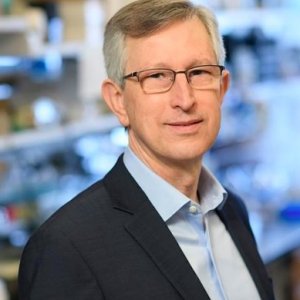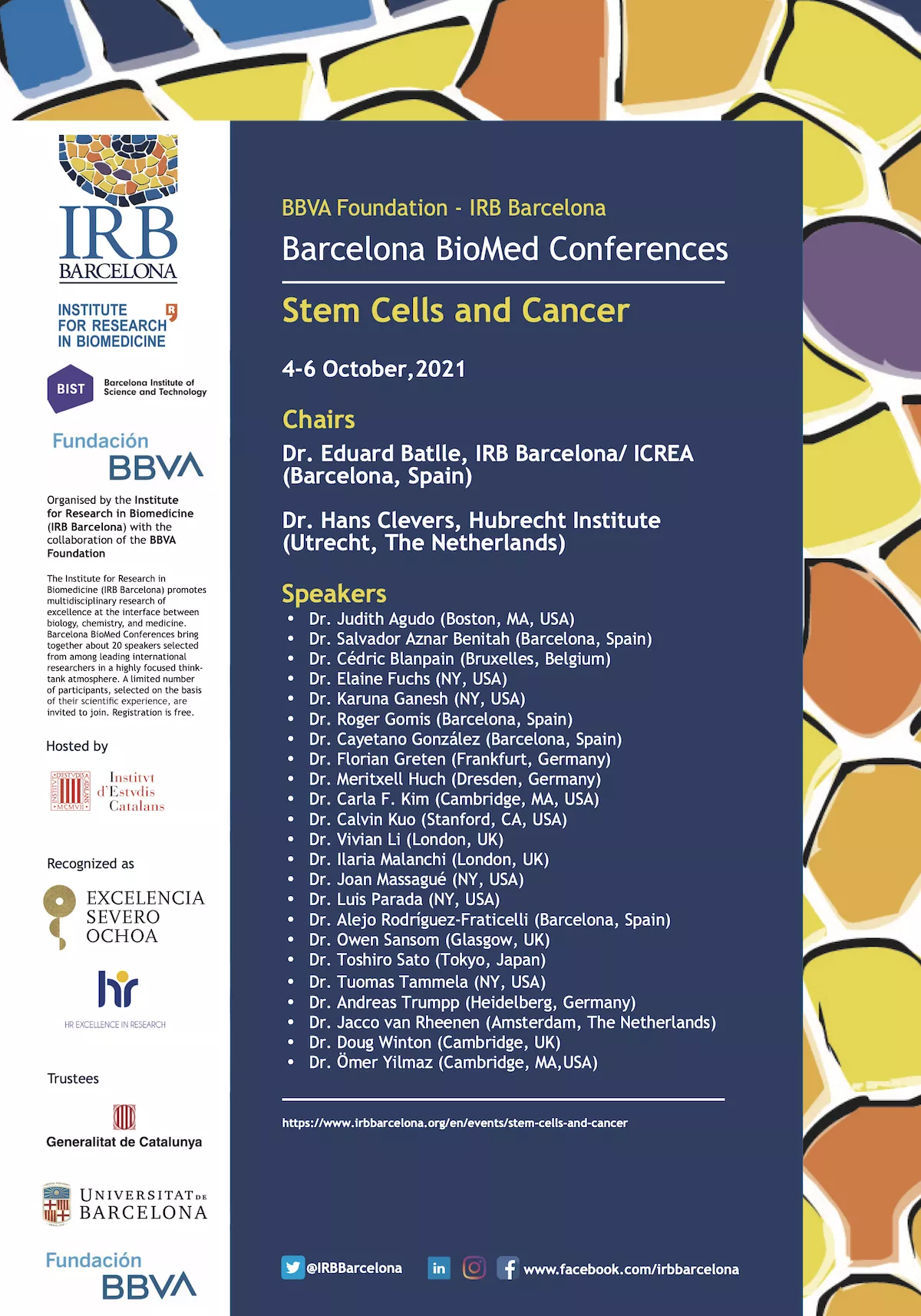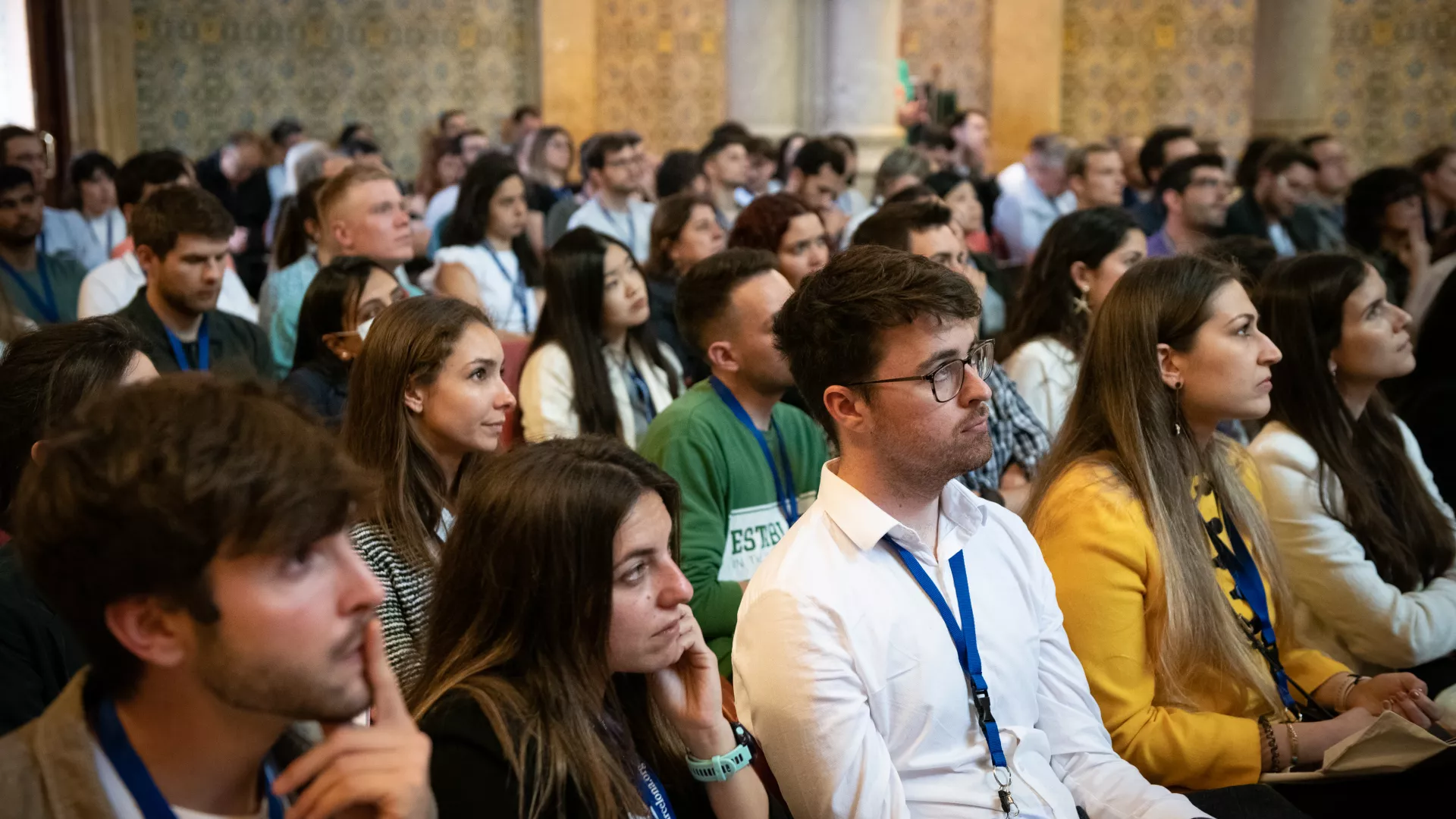The cancer stem cell (CSC) concept was proposed four decades ago, and states that tumor growth, analogous to the renewal of healthy tissues, is fueled by small numbers of dedicated stem cells. It has gradually become clear that many tumors harbor CSCs in dedicated niches, and yet their identification and eradication has not been as obvious as was initially hoped. Recent studies have provided unprecedented insights into CSC plasticity, quiescence, renewal, and therapeutic response.
Presentación
Conference description
This conference will provide an interdisciplinary forum for researchers interested in the connections between stem cell biology and cancer to meet and discuss the latest advances in this field. Specific topics to be discussed include stem cell metabolism, the interaction of healthy and tumor stem cells with the immune environment and the roles of CSCs during metastasis and therapy resistance.
Conference organizers

Dr. Eduard Batlle
IRB Barcelona/ ICREA (Barcelona, Spain)

Dr. Hans Clevers
Hubrecht Institute (Utrecht, The Netherlands)
Sponsored by:

VERY IMPORTANT:
The vaccination certificate must be provided on the first day of the conference.
All anti-Covid measures will be strictly adhered to. We are unable to foresee whether, in October, it will be necessary to do a rapid daily antigen test before starting the sessions. We will be informed at all times about health measures, and if the health authorities recommend the test in October, we will make the appropriate arrangements.
Registration deadline: 31 August, 2021
Due to the limited capacity of the room and in event of exceeding the number of people allowed, priority registration will be given to those presenting posters or abstracts for short talks.
We will contact all registered people in the first week of September
There is no registration fee for this conference.
Programme
Download complete programme
Monday, 4 October
8.30 Registration
9.00 Welcome by Francesc Posas (Institute for Research in Biomedicine, Director) and organizers (Eduard Batlle & Hans Clevers)
Session I
Chair: Elaine Fuchs
9.15 Skin Stem Cells: Survival of the Fittest
Elaine Fuchs, Howard Hughes Medical Institute, The Rockefeller University (NY, USA)
9.50 Quiescent stem cells and cancer cells evade T cell attack
Judith Agudo, Dana-Farber Cancer Institute, Harvard Medical School (Boston, MA, USA)
10.25 Short talk 1: Dissecting the role of p53-activated target gene ZMAT3 in cancer development
Ana Janic, Universitat Pompeu Fabra (Barcelona, Spain)
10.45-11.30 Coffee break and poster session
11.30 Short talk 2: Chromosome 9p21.3 Coordinates Cell Intrinsic and Extrinsic Tumor Suppression
Francisco Barriga, Memorial Sloan Kettering Cancer Center (NY, USA)
11.50 Regulation of Hematopoietic and Leukemic Stem Cells
Andreas Trumpp, Deutsches Krebsforschungszentrum (Heidelberg, Germany)
12:25 Unraveling the determinants of stem cell heterogeneity through multiplexed single-cell lineage tracing
Alejo Rodríguez-Fraticelli, IRB Barcelona (Barcelona, Spain)
13.00-14.30 Lunch & Poster session (IEC courtyard)
Session II
Chair: Owen Sansom
14.30 The origins of somatic mosaicism in colonic epithelium (online)
Doug Winton, Cancer Research UK Cambridge Institute (Cambridge, UK)
15.05 Retrograde movements determine effective stem cell numbers in intestinal crypts
Jacco van Rheenen, Netherlands Cancer Institute and Oncode Institute (Amsterdam, The Netherlands)
15.40 Short talk 3: Mutant clones in normal epithelium outcompete and eliminate early esophageal micro-tumors
Bartomeu Colom, Wellcome Sanger Institute, Cambridge, UK
16.00-16.30 Coffee break
16.30 Short talk 4: Levelling out differences in aerobic glycolysis neutralizes the competitive advantage of oncogenic PIK3CA mutant progenitors in the esophagus
Albert Herms, Wellcome Sanger Institute, Hinxton (Cambridge, UK)
16.50 Wnt signal regulation in intestinal stem cell and cancer (online)
Vivian Li, The Francis Crick Institute (London, UK)
17.25 Dietary control of stem cells in physiology and disease
Ömer Yilmaz, Koch Institute for Integrative Cancer Research (Cambridge, MA, USA)
18.00 Understanding the mechanistic underpinnings of transformation of Apc deficient stem cells
Owen Sansom, Beatson Institute (Glasgow, UK)
18.35 End of session
20.00 Speakers dinner (Restaurant Fonda España) (Sant Pau, 9-11)
Tuesday, 5 October
Session III
Chair: Karuna Ganesh
9.15 Paracrine survival signaling upon stem cell depletion in colorectal cancer
Florian Greten, Georg-Speyer-Haus, Institut für Tumorbiologie und experimentelle Therapie (Frankfurt, Germany)
9.50 Short talk 5: Unravelling the role of early dissemination in colorectal cancer
Julie Pannequin, IGF, Univ. Montpellier, CNRS, INSERM (Montpellier, France
10.10 Short talk 6: The comparative roadmaps of reprogramming and transformation unveiled that cellular plasticity is broadly controlled by a c-Myc/Atoh8/Sfrp axis
Fabrice Lavial, Cancer Research Center of Lyon (Lyon, France)
10.30-11.15 Coffee break and poster session
11.15 Drug-tolerant persister cells in colorectal cancer
Eduard Batlle, IRB Barcelona/ ICREA (Barcelona, Spain)
11.50 Modeling human colon cancer stem cells using organoid technology (online)
Toshiro Sato, Keio University School of Medicine (Tokyo, Japan)
12.25 Dissecting Metastatic Plasticity
Karuna Ganesh, Sloan Kettering Institute and Gastrointestinal Oncology Service, Memorial Sloan Kettering Cancer Center (NY, USA)
13.00-14.30 Lunch (IEC courtyard)
Session IV
Chair: Ilaria Malanchi
14.30 Immune Regulation of Metastasis Initiating Cells (online)
Joan Massagué, Sloan Kettering Institute, Memorial Sloan Kettering Cancer Center (NY, USA)
15.05 Short talk 7: Antigen presentation machinery regulation shapes immunoediting of cancer stem cells during immune-checkpoint blockade resistance
Toni Celià-Terrassa, Hospital del Mar Medical Research Institute (IMIM), (Barcelona, Spain)
15.25 ER+ breast cancer metastasis cell fate-mapping
Roger Gomis, IRB Barcelona/ ICREA (Barcelona, Spain)
16.00-16.30 Coffee break
16.30 Mechanisms regulating tumor transition states
Cédric Blanpain, WELBIO, Université Libre de Bruxelles (Bruxelles, Belgium)
17.05 Short talk 8 A developmental cellular hierarchy in melanoma uncouples growth and metastatic phenotypes
Panagiotis Karras, VIB Center for Cancer Biology (Leuven, Belgium)
17.25 Interplay between metastatic initiating cells and tumour-associated Schwann cell activation to drive metastasis: role of dietary fatty acids
Salvador Aznar Benitah, IRB Barcelona/ ICREA (Barcelona, Spain)
18.00 The Inside out Stemness of Metastasis
Ilaria Malanchi, The Francis Crick Institute (London, UK)
18.35 End of session
20.00 Speakers and Short talks dinner (Restaurant Sagardi 1881, Museu d’història de Catalunya, Palau de Mar) (Plaça Pau Vila, 3, 4th floor)
Wednesday, 6 October
Session V
Chair: Tuomas Tammela
9.15 Organoids to Model Human Disease
Hans Clevers, Hubrecht Institute (Utrecht, The Netherlands)
9.50 Drosophila developmental tumours recapitulate distinct traits of pediatric cancer
Cayetano González, IRB Barcelona/ICREA (Barcelona, Spain)
10.25 Short Talk 9: Identifying the role of cell plasticity “first” in driving adaptive evolution to therapeutic stresses in solid paediatric cancer
Alejandra Bruna, The Institute of Cancer Research (London, UK)
10.45-11.30 Coffee break and poster session
11.30 Mechanisms driving differentiation of highly plastic pancreas cancer cells
Tuomas Tammela, Memorial Sloan Kettering Cancer Center (NY, USA)
12:05 Short Talk 10: Aggressive PDACs Show Hypomethylation of Repetitive Elements and the Execution of an Intrinsic IFN Program Linked to a Ductal Cell of Origin
Elisa Espinet, German Cancer Research Center (DKFZ) (Heidelberg, Germany)
12.25 Liver organoids for the study of cellular plasticity in regeneration and cancer
Meritxell Huch, Max Planck Institute of Molecular Cell Biology and Genetics (Dresden, Germany)
13.00-14.30 Lunch (IEC courtyard)
Session VI
Chair: Meritxell Huch
14.30 Cell heterogeneity and hierarchy in Glioblastoma (GBM) (online)
Luis Parada, Memorial Sloan Kettering Cancer Cells (NY, USA)
15.05 Short Talk 11: Modelling intra-tumour heterogeneity and plasticity in single cell-derived three-dimensional branching pancreatic cancer organoids
Aristeidis Papargyriou, Technical University of Munich (Munich, Germany)
15.25 Short Talk 12: Differentiation therapy in colorectal cancer
Maxim Norkin, École Polytechnique Fédérale de Lausanne (EPFL) (Lausanne, Switzerland)
15.45-16.15 Coffee break
16.15 Organoid modeling of lung disease and early stage lung cancer (online)
Carla Kim, Havard Stem Cell Institute (Cambridge, MA, USA)
16.50 Organoid modeling of clonogenicity during tumor evolution and drug response (online)
Calvin Kuo, Standford University School of Medicine (Stanford, CA, USA)
17.25 Concluding remarks and end of conference
Localización
The BARCELONA BIOMED CONFERENCE Stem Cells and Cancer will be hosted by the Institut d'Estudis Catalans (IEC) in the heart of downtown Barcelona. Talks will take place in the Sala Prat de Riba.
Institut d'Estudis Catalans
C. del Carme, 47
08001 Barcelona
Tel +34 932 701 620
Fax +34 932 701 180
informacio iec.cat
iec.cat
www.iec.cat
How to reach the IEC:
From Barcelona El Prat airport:
- Via Taxi
A taxi from the airport to the IEC should take about 25 minutes and cost around 25-30 euros depending on traffic and luggage. - Via Train
The RENFE train leaves the airport every half an hour and will take you to Passeig de Gracia station, in about 25 mins and costs 2.80 Euros for a single ticket. Change here for the Green Line metro to Liceu. The IEC is a 10-minute walk from the metro station (see map). - Via Bus
A transfer service called "Aerobus" will also take you from the airport to Plaça Catalunya and costs 4.25 Euros. The journey time is around 30 minutes. The IEC is a 10-minute walk from the Plaça Catalunya (see map).
From Girona airport:
The "Barcelona bus" runs a transfer service between Girona Airport and Barcelona's city centre, scheduled to coincide with Ryan Air flights. The bus stops right outside the airport and will take you to Estacio d'Autobusos Barcelona Nord (Barcelona's main bus terminal), with a journey time of about 1 hr 10 min. The nearest Metro stop to the bus station is Arc De Triomf, which is a 5-10 minute walk from the bus station (exit the bus station Sortida Nàpols). Take the Red Line (L1) to Plaça Catalunya. The IEC is a 10-minute walk from the Plaça Catalunya (see map).
From Sants train station:
Transfer to the metro Red Line (L1), and get off at laça Catalunya. The IEC is a 10-minute walk from the Plaça Catalunya (see map).
If you are arriving locally:
 Metro
Metro
Plaça Catalunya (lines 1 and 3)
Liceu (line 3) FGC
FGC
Plaça Catalunya (train from Sarrià) Renfe
Renfe
Plaça Catalunya Buses
Buses
41, 55, 141 (Plaça Catalunya stop)
14, 18, 59, 91 (Rambla stop)
Barcelona Metropolitan Transport webiste (with metro and bus maps)
Accomodation
Speakers will be lodged at the Hotel Catalonia Ramblas
c/ Pelayo, 28
08001 Barcelona
Telephone: +34 93 316 84 00
Fax: +34 93 316 84 01
e-mail: ramblas.comercial@hoteles-catalonia.es
www.hoteles-catalonia.com
Other hotels
A list of additional hotels within walking distance of the IEC can be found at: http://www.barcelona-tourist-guide.com/en/hotels/hotelmaps/ramblas-hotel-barcelona.html (The IEC is located near the blue point 08/5 star). Rates will vary depending on choice of hotel and season. Please check with the hotel of your choice directly for the best offer.
Residences
Another possibility is the Residencia dels Investigadors (Investigators Residence Hall), which has an agreement with the CSIC (Spanish National Research Council) and the Catalan Government. It is located just behind the IEC, and is available for short-term stays. Rates range between 70 euros for a single room, to 99 euros for a double room.
Residencia dels Investigadors
C/ Hospital, 64
08001 Barcelona
Telephone: +34 93 443 86 10
Fax: +34 93 442 82 02
e-mail: investigadors resa.es
resa.es
www.resa.es/eng/residencias/investigadors
Participants registered for events in the Barcelona BioMed series should contact the hotels and residences directly to arrange bookings and payment.
Speakers

Dr. Judith Agudo
Dana-Farber Cancer Institute, Harvard Medical School (Boston, MA, USA)

Dr. Salvador Aznar Benitah
IRB Barcelona/ ICREA (Barcelona, Spain)

Dr. Eduard Batlle
IRB Barcelona/ ICREA (Barcelona, Spain)

Dr. Cédric Blanpain
Université Libre de Bruxelles (Bruxelles, Belgium)

Dr. Hans Clevers
Hubrecht Institute (Utrecht, The Netherlands)

Dr. Elaine Fuchs
The Rockefeller University (USA)

Dr. Karuna Ganesh
Memorial Sloan Kettering Cancer Center (NY, USA)

Dr. Roger Gomis
IRB Barcelona/ICREA (Barcelona, Spain)

Dr. Cayetano González
IRB Barcelona/ICREA (Barcelona, Spain)

Dr. Florian Greten
Georg-Speyer-Haus, Institut für Tumorbiologie und experimentelle Therapie (Frankfurt, Germany)

Dr. Meritxell Huch
Max Planck of Molecular Cell Biology and Genetics (Dresden, Germany)

Dr. Carla Kim
Harvard Stem Cell Institute (Cambridge, MA, USA)

Dr. Calvin Kuo
Stanford University (Stanford, CA, USA)

Dr. Vivian Li
The Francis Crick Institute (London, UK)

Dr. Ilaria Malanchi
The Francis Crick Institute (London, UK)

Dr. Joan Massagué
Memorial Sloan Kettering Cancer Center (NY, USA)

Dr. Luis Parada
Memorial Sloan Kettering Cancer Center (NY, USA)
Dr. Alejo Rodríguez-Fraticelli
IRB Barcelona (Barcelona, Spain)

Dr. Owen Sansom
Beatson Institute (Glasgow, UK)

Dr. Toshiro Sato
Keio University (Tokyo, Japan)

Dr. Tuomas Tammela
Memorial Sloan Kettering Cancer Center (NY, USA)

Dr. Andreas Trumpp
Deutsches Krebsforschungszentrum (Heidelberg, Germany)

Dr. Jacco van Rheenen
Netherlands Cancer Institute (Amsterdam, The Netherlands)

Dr. Doug Winton
Cancer Research UK Cambridge Institute (Cambridge, UK)

Dr. Ömer Yilmaz
Koch Institute for Integrative Cancer Research (Cambridge, MA,USA)
Poster


